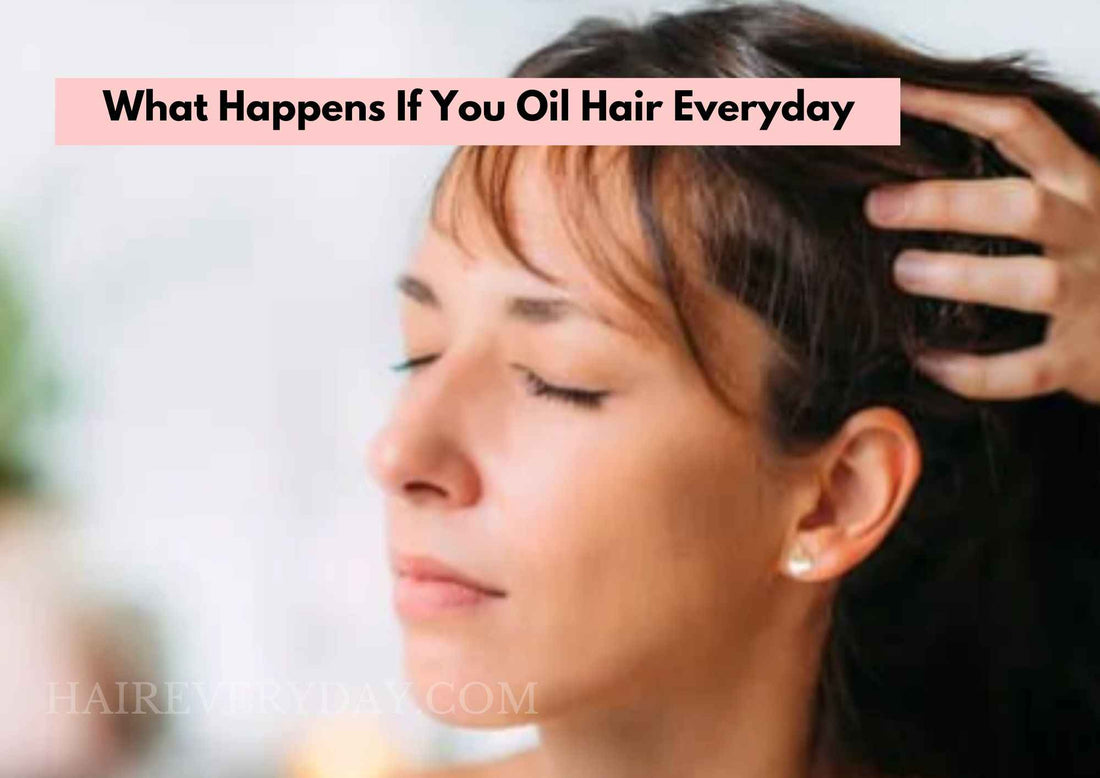Read on to know what happens if you oil hair everyday and if this practice leaves hair oily and damaged. Also learn how to oil your hair the right way.
As someone who has always struggled with dry, frizzy hair, I’ve always been on the lookout for ways to keep my locks looking healthy and shiny. One tip that I’ve heard time and time again is to oil your hair on a regular basis. But is this really a good idea? What happens if you oil your hair every day?
Why You Should Trust Haireveryday?
The author of this article, Leah Marie Priest has a degree in Cosmetology with years of experience in dealing with hair care, scalp care, and hairstyling. As someone who extensively deals with all kinds of hair textures, products, styling methods and more, hair Leah Marie knows what kind of products and procedures suit each hair type and person. We have also tested these hair products and processes ourselves to provide you an unbiased review about every product. Each of our articles are also reviewed by a team of medical professionals so that you get the most accurate and expert-reviewed information.
What Happens If You Oil Hair Everyday
Firstly, over-oiling your hair can lead to a buildup of oil on your scalp. This buildup can clog your hair follicles, which can lead to hair fall and dandruff. Additionally, an oily scalp can attract dirt and dust, making your hair look dull and greasy.
Secondly, using too much oil can weigh down your hair and make it look flat. This is especially true for people with fine or thin hair. Applying oil every day can also make your hair appear greasy and unclean, which is not a desirable look.
Lastly, over-oiling your hair can also cause your hair to become dependent on the oil. This means that your hair may become dry and brittle without the constant application of oil. This can be a problem if you are unable to oil your hair every day.

Benefits of Daily Hair Oiling
As someone who oils their hair daily, I have experienced firsthand the numerous benefits it can provide. Here are a few reasons why daily hair oiling can be beneficial:
Improved Scalp Health
Daily hair oiling can help improve the health of your scalp by providing nourishment and hydration to the skin. This can help prevent dryness, flakiness, and itchiness, which are common scalp issues. Additionally, massaging the scalp while oiling can help improve blood circulation, which can promote hair growth and improve overall scalp health.
Enhanced Hair Growth
One of the most significant benefits of daily hair oiling is enhanced hair growth. When you oil your hair regularly, you are providing your hair with the nutrients it needs to grow and thrive. This can help prevent hair breakage and split ends, which can lead to longer, healthier hair over time.

Natural Hair Conditioning
Daily hair oiling can also act as a natural hair conditioner, helping to keep your hair soft, shiny, and manageable. This is because the oil helps to seal in moisture, preventing your hair from becoming dry and brittle.
Additionally, certain oils, such as coconut oil, have been shown to penetrate the hair shaft and provide deep conditioning benefits as they are emollients and trap moisture inside the hair cuticle. (Mysore, Venkataram, and Arpita Arghya. “Hair Oils: Indigenous Knowledge Revisited.” International journal of trichology vol. 14,3 (2022): 84-90. doi:10.4103/ijt.ijt_189_20)
So basically, daily hair oiling can provide numerous benefits for your hair and scalp. However, it is important to choose the right oil for your hair type and to avoid using too much oil, as this can lead to greasiness and buildup. With proper use, daily hair oiling can be a key part of a healthy hair care routine.
Potential Drawbacks of Excessive Hair Oiling
Yes, there are some potential drawbacks of this practice. I have often noticed these issues can arise from excessive hair oiling:
Scalp Build-Up
When you oil your hair every day, it can lead to a build-up of oil on your scalp. This can cause your scalp to become greasy, itchy, and irritated. In some cases, it can even lead to dandruff. To avoid this, it is important to use a gentle shampoo and conditioner that can effectively remove the excess oil from your scalp.
Hair Weakening
Excessive hair oiling can also weaken your hair strands over time. The oil can weigh down your hair and cause it to become limp and lifeless. This can make it difficult to style your hair and can even lead to breakage. To prevent this, it is important to use a light oil and to avoid applying too much of it.
Increased Hair Washing
If you oil your hair every day, you may find that you need to wash your hair more frequently. This can be time-consuming and can also lead to dryness and damage. To avoid this, it is important to use a gentle shampoo and conditioner that can effectively remove the excess oil from your hair without stripping it of its natural oils.
To wrap it up I want to say that while hair oiling can be beneficial for hair health, excessive hair oiling can lead to several potential drawbacks. It is important to use a light oil, avoid applying too much of it, and use a gentle shampoo and conditioner to avoid these issues.
How To Oil Your Hair The Right Way

Choosing the Right Oil
When it comes to selecting the right oil for your hair, it’s important to consider your hair type and specific needs. For example, if you have dry hair, you may want to opt for heavier oils like coconut or argan oil. On the other hand, if you have fine or oily hair, lighter oils like jojoba or grape seed oil may be a better choice.
It’s also important to choose high-quality oils that are free from additives and chemicals. Look for oils that are cold-pressed and organic to ensure that you’re getting the best possible product for your hair.
Proper Application Techniques
To get the most benefit from your hair oil, it’s important to apply it properly. Start by warming the oil in your hands before applying it to your hair. This will help to activate the oil and make it more effective.
Next, apply the oil to the ends of your hair first, working your way up to the roots. This will help to prevent your scalp from becoming too oily and weighed down.
Massage the oil into your scalp using gentle circular motions. This will help to stimulate blood flow to the scalp and promote healthy hair growth.
Finally, leave the oil on your hair for at least 30 minutes before washing it out with a gentle shampoo. This will give the oil enough time to penetrate your hair and provide maximum benefits.
Balancing Frequency and Quantity
While oiling your hair can be beneficial, it’s important to find the right balance between frequency and quantity. Over-oiling your hair can lead to a greasy buildup and weigh your hair down, while under-oiling can lead to dryness and breakage.
As a general rule, aim to oil your hair once or twice a week, depending on your hair type and needs. Start with a small amount of oil and gradually increase the quantity as needed.
By following these simple tips, you can ensure that you’re oiling your hair the right way and reaping all the benefits that come with it.
Conclusion
Essentially, hair oil is meant to nourish and hydrate your hair, helping to prevent breakage and keep your locks looking smooth and shiny. However, using too much oil or using it too frequently can actually have the opposite effect, leaving your hair looking greasy and weighed down.
So, to sum it up, it’s okay to oil hair everyday as long as you’re cleaning it everyday by shampooing and rinsing. Otherwise you need to limit hair oiling to 2-3 times a week or even less if you have oily scalp or straight hair textures.
Also Read:
Lightweight Oils For Low Porosity Hair
Why Do I Lose Hair After Applying Oil
Pre Pooing with Coconut Oil For 4c/4b Hair
To Summarize

